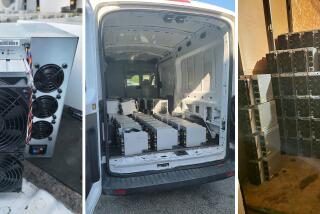Suspect Is Arrested in Theft of Bank Data
- Share via
SAN FRANCISCO — Police arrested a California man in connection to a burglary in which a computer with sensitive information about thousands of Wells Fargo & Co. customers was stolen, authorities said Wednesday.
Edward Jonathan Krastof, 38, was arrested at his home late Tuesday in the Bay Area town of Concord, the same town where the computer was stolen this month, Concord Police Sgt. Steve White said.
Data on the computer included names, addresses and account and Social Security numbers of people with personal lines of credit used for consumer loans and overdraft protection.
The bank has declined to say how many customers might be affected but said it was a small percentage of its 23 million customers.
Under a California law enacted this year aimed at curtailing identity theft, companies are required to notify customers when their computerized personal information is believed to have been stolen.
There’s no indication that any of the customer information has been misused, said Doreen Woo Ho, who heads Wells’ consumer credit group. The bank alerted affected customers about the risks of identify theft in recent letters and promised to compensate them for any potential losses.
Wells said Wednesday that it would remain on the lookout for unusual activity in their accounts. The bank also is standing by a previous offer to buy affected customers a one-year subscription to a watchdog service that monitors consumers’ credit reports.
Krastof, who works at a Home Depot store, confessed to stealing the computer as well as another computer and a laptop after breaking into the office of a Wells Fargo analyst, White said.
Police recovered the equipment at Krastof’s home, along with equipment used for scanning identity cards and checks, he said.
“He is a low-level ID-theft kind of guy,” White said of Krastof.
Krastof told police that he did not know sensitive data were on the computer, White said.
Wells Fargo had offered a $100,000 reward in the case, but police said the bank would be able to keep the money because the arrest was made from regular police work and not a tip.
Investigators traced the computer to Krastof when he logged on to his America Online account through one of the stolen computers, White said. That enabled authorities to connect the computer’s Internet protocol address, a number that identifies a computer on the Web, to Krastof’s home address through his AOL account, White said.
*
Associated Press and Reuters were used in compiling this report.
More to Read
Sign up for Essential California
The most important California stories and recommendations in your inbox every morning.
You may occasionally receive promotional content from the Los Angeles Times.













